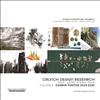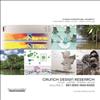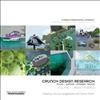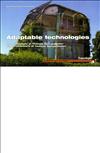
Food, water, energy nexus. Volume 3 - Carbon positive 2020-2100
Today more than 50% of ecologies in the world are determined by unsustainable industrialisation processes. The latest United Nations Intergovernmental Panel on Climate Change (IPCC) reports showing that we are quickly arriving at points of no return in the warming of our planet. Under the three year umbrella of CRUNCH (Climate Resilient Urban Nexus CHoices), and the Food-Water-Energy (FWE) Nexus research, this Third Volume looks at designing adaptive, resilient, biology-inspired, and carbon-positive green-blue infrastructures and buildings, self-growing coastal barrier islands on a timeline from 2019 to 2100.
cod. 1098.2.64



